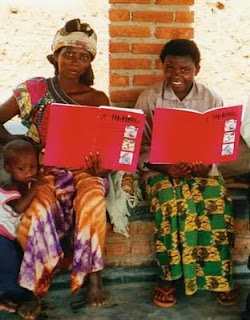 |
| RUHI BOOKS |
“The content of the books of the Ruhi Institute are unjustified, the only valid way to teach the Baha’I Faith to the peoples of the world is through the use of the scriptures of their respective religions.
Bahá’u’lláh’s message be delivered to the masses of humanity on the basis of the Holy Scriptures of the past.”
“I do hope somehow that all friends become more and more deepened by Ruhi or otherwise. Personally I do not count much on Ruhi.”
“That's true; the parents everywhere would like to send their children to a good school with professional teachers. But the point is that doing 1 or 2 Ruhi courses does not make one professional in teaching children classes. I have done book 3 (just out of obedience to our institutions) but believe me I cannot handle a children class. I am not so good with children education even though I am actually in academic field and teaching at university level. But my wife who has not done book 3 yet is so good with children and children classes that I see it's in her nature to be an educator of children.
Meaning that children’s class teacher is a job, is a position for which people can be assigned, can be asked, or can volunteer. To look for the best person means one is looking for skills and characteristics, and in the world today a lot of people think that qualifications, having done a certain course indicate that that person has the skills needed for the job.”
“At this time when we have lack of human resources, it would be much better for all of us to make use of our resources to best of our abilities. I have seen some places where they had such requirement, the number of children classes in fact reduced as there were not enough children class teachers who have finished book 3. So the LSA of that place was urging friends there to come and study book 3 to be able to offer more children classes.”
“To me it shows stupidity of a decision by an LSA to require all children class teachers to pass Book 3 or now a days Book 5.
Bahá’u’lláh’s message be delivered to the masses of humanity on the basis of the Holy Scriptures of the past.”
“I do hope somehow that all friends become more and more deepened by Ruhi or otherwise. Personally I do not count much on Ruhi.”
“That's true; the parents everywhere would like to send their children to a good school with professional teachers. But the point is that doing 1 or 2 Ruhi courses does not make one professional in teaching children classes. I have done book 3 (just out of obedience to our institutions) but believe me I cannot handle a children class. I am not so good with children education even though I am actually in academic field and teaching at university level. But my wife who has not done book 3 yet is so good with children and children classes that I see it's in her nature to be an educator of children.
Meaning that children’s class teacher is a job, is a position for which people can be assigned, can be asked, or can volunteer. To look for the best person means one is looking for skills and characteristics, and in the world today a lot of people think that qualifications, having done a certain course indicate that that person has the skills needed for the job.”
“At this time when we have lack of human resources, it would be much better for all of us to make use of our resources to best of our abilities. I have seen some places where they had such requirement, the number of children classes in fact reduced as there were not enough children class teachers who have finished book 3. So the LSA of that place was urging friends there to come and study book 3 to be able to offer more children classes.”
“To me it shows stupidity of a decision by an LSA to require all children class teachers to pass Book 3 or now a days Book 5.
It would be similar to tell a Baha'i Teacher not to teach the Faith unless he/she has finished book 2 and book 6.”
